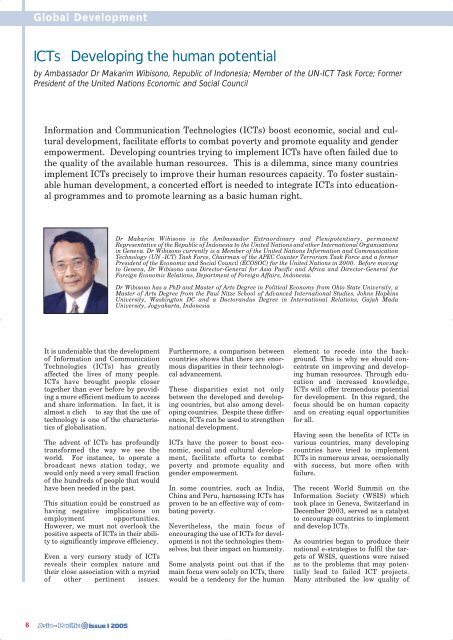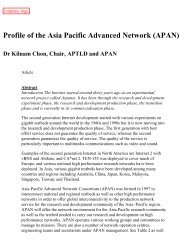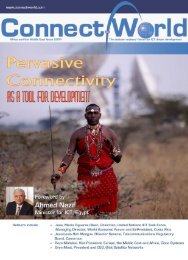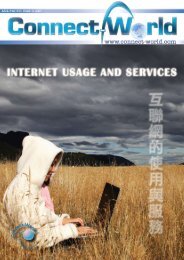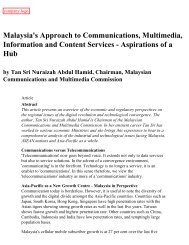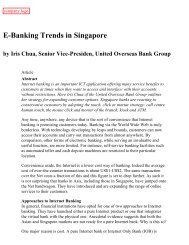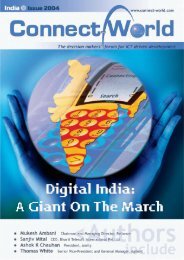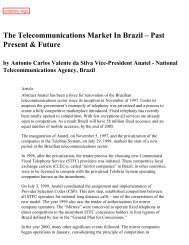Contents - Connect-World
Contents - Connect-World
Contents - Connect-World
Create successful ePaper yourself
Turn your PDF publications into a flip-book with our unique Google optimized e-Paper software.
Global Development<br />
ICTsDeveloping the human potential<br />
by Ambassador Dr Makarim Wibisono, Republic of Indonesia; Member of the UN-ICT Task Force; Former<br />
President of the United Nations Economic and Social Council<br />
Information and Communication Technologies (ICTs) boost economic, social and cultural<br />
development, facilitate efforts to combat poverty and promote equality and gender<br />
empowerment. Developing countries trying to implement ICTs have often failed due to<br />
the quality of the available human resources. This is a dilemma, since many countries<br />
implement ICTs precisely to improve their human resources capacity. To foster sustainable<br />
human development, a concerted effort is needed to integrate ICTs into educational<br />
programmes and to promote learning as a basic human right.<br />
Dr Makarim Wibisono is the Ambassador Extraordinary and Plenipotentiary, permanent<br />
Representative of the Republic of Indonesia to the United Nations and other International Organisations<br />
in Geneva. Dr Wibisono currently is a Member of the United Nations Information and Communication<br />
Technology (UN -ICT) Task Force, Chairman of the APEC Counter Terrorism Task Force and a former<br />
President of the Economic and Social Council (ECOSOC) for the United Nations in 2000. Before moving<br />
to Geneva, Dr Wibisono was Director-General for Asia Pacific and Africa and Director-General for<br />
Foreign Economic Relations, Department of Foreign Affairs, Indonesia.<br />
Dr Wibisono has a PhD and Master of Arts Degree in Political Economy from Ohio State University, a<br />
Master of Arts Degree from the Paul Nitze School of Advanced International Studies, Johns Hopkins<br />
University, Washington DC and a Doctorandus Degree in International Relations, Gajah Mada<br />
University, Jogyakarta, Indonesia<br />
It is undeniable that the development<br />
of Information and Communication<br />
Technologies (ICTs) has greatly<br />
affected the lives of many people.<br />
ICTs have brought people closer<br />
together than ever before by providing<br />
a more efficient medium to access<br />
and share information. In fact, it is<br />
almost a clich to say that the use of<br />
technology is one of the characteristics<br />
of globalisation.<br />
The advent of ICTs has profoundly<br />
transformed the way we see the<br />
world. For instance, to operate a<br />
broadcast news station today, we<br />
would only need a very small fraction<br />
of the hundreds of people that would<br />
have been needed in the past.<br />
This situation could be construed as<br />
having negative implications on<br />
employment opportunities.<br />
However, we must not overlook the<br />
positive aspects of ICTs in their ability<br />
to significantly improve efficiency.<br />
Even a very cursory study of ICTs<br />
reveals their complex nature and<br />
their close association with a myriad<br />
of other pertinent issues.<br />
Furthermore, a comparison between<br />
countries shows that there are enormous<br />
disparities in their technological<br />
advancement.<br />
These disparities exist not only<br />
between the developed and developing<br />
countries, but also among developing<br />
countries. Despite these differences,<br />
ICTs can be used to strengthen<br />
national development.<br />
ICTs have the power to boost economic,<br />
social and cultural development,<br />
facilitate efforts to combat<br />
poverty and promote equality and<br />
gender empowerment.<br />
In some countries, such as India,<br />
China and Peru, harnessing ICTs has<br />
proven to be an effective way of combating<br />
poverty.<br />
Nevertheless, the main focus of<br />
encouraging the use of ICTs for development<br />
is not the technologies themselves,<br />
but their impact on humanity.<br />
Some analysts point out that if the<br />
main focus were solely on ICTs, there<br />
would be a tendency for the human<br />
element to recede into the background.<br />
This is why we should concentrate<br />
on improving and developing<br />
human resources. Through education<br />
and increased knowledge,<br />
ICTs will offer tremendous potential<br />
for development. In this regard, the<br />
focus should be on human capacity<br />
and on creating equal opportunities<br />
for all.<br />
Having seen the benefits of ICTs in<br />
various countries, many developing<br />
countries have tried to implement<br />
ICTs in numerous areas, occasionally<br />
with success, but more often with<br />
failure.<br />
The recent <strong>World</strong> Summit on the<br />
Information Society (WSIS) which<br />
took place in Geneva, Switzerland in<br />
December 2003, served as a catalyst<br />
to encourage countries to implement<br />
and develop ICTs.<br />
As countries began to produce their<br />
national e-strategies to fulfil the targets<br />
of WSIS, questions were raised<br />
as to the problems that may potentially<br />
lead to failed ICT projects.<br />
Many attributed the low quality of<br />
6


